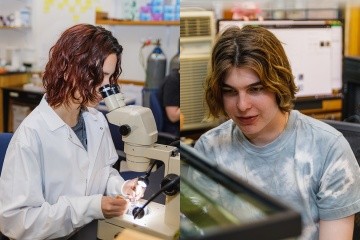
Ken Colodner is a cellular and molecular neuroscientist whose research is focused on understanding how communication between the two major cell types in the brain, neuronal and glial cells, is disrupted in neurodegenerative diseases. He is particularly interested in understanding the disease process of Alzheimer's disease and related tauopathies, a class of diseases characterized by the pathological buildup of the protein, tau. Using modern genetic techniques in the fruit fly, Drosophila melanogaster, he examines the functional consequences of tau expression on neuronal-glial interactions in the fly brain. These experiments are aimed towards understanding mechanisms of tau toxicity, and identifying novel, therapeutic targets for these disorders.
As a doctoral student at Harvard Medical School, Ken Colodner worked with pioneers in the field of neurodegenerative disease research to identify a role for glial cell dysfunction in contributing to neurodegenerative disease progression. As a postdoctoral fellow at Boston Children's Hospital, he helped identify key mediators of synapse loss in models of aging and Alzheimer's disease. His research has been published in the Journal of Neuroscience, Journal of Neuropathology and Experimental Neurology, and the Journal of Experimental Neuroscience.
Throughout his previous research training, Ken Colodner has taught full-year seminars on glial cells and has served as a teaching fellow for Behavioral Neuroscience and Biology of Neurodegenerative Diseases at Harvard University. He has twice been awarded the Derek Bok Certificate of Distinction in Teaching. At Mount Holyoke he teaches Introduction to Neuroscience and Behavior, Cellular and Molecular Neuroscience, and Biology of Neurological Disease.
Education
- B.A., Northwestern University
- Ph.D., Harvard University
- Postdoctoral Fellow, Boston Children's Hospital


